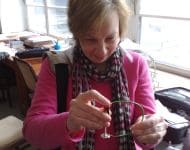- Details
Nicola is now a member of the Kuratórium (similar to a board of trustees) of Múzeumok és Látogatók Alapítvány (Foundation for Museums and Visitors). Nicola has had a close working relationship with the foundation since its inception in 2004, and brings knowledge and skills from her experience with museums in the UK.
More information about the Foundation at http://www.mlalapitvany.hu
- Details

The Elektrotechnikai Múzeum at Kazinczy utca 21, VII. Budapest, explains practical applications of electricity from early developments in the 1860s to the present day. With flashes and bangs, the curator demonstrated the 100,000 volts of Ányoss Jedlik's 1873 cascade capacitor battery. The museum offers practical hands-on sessions for primary and secondary school pupils, to make working electrical equipment from household items, such as a Van der Graaf generator involving a Sprite can.
Here's one you can easily try at home: you need a round magnet, a screw, an AA battery and a length of insulated copper wire. The point of the screw is held against the negative terminal of the battery, by the magnet on the head of the screw. Hold one end of the copper wire on the positive terminal of the battery with your finger, and hold the other end of the wire beside the magnet. This causes the screw and the magnet to rotate with increasing speed.
The workshop about the Inspiring Learning for All Framework, Generic Learning Outcomes and General Social Outcomes for the Múzeumok és Látogatók Alapítván was well received. These methods of measuring the impact of museums' work on individuals and communities can be used to further develop museums' programmes and raise their profile with visitors and funders.
- Details
(This page was updated on 1/11/2016, links and photos were outdated and may have been removed.)
On 6 February 2009 Nicola will be delivering a workshop on evaluation techniques and the Inspiring Learning for All framework, and the Museum of Commerce and Trade in Budapest, for the Museums and Visitors Foundation (see link removed). ILFA is used in museums, libraries and archives in the UK to help organisations provide better services and learning opportunities. The Generic Learning Outcomes are used to measure learning, and the Generic Social Outcomes demonstrate the impact programmes have on individuals and communities.
